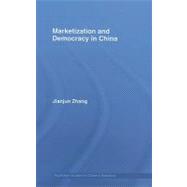
Note: Supplemental materials are not guaranteed with Rental or Used book purchases.
Purchase Benefits
Looking to rent a book? Rent Marketization and Democracy in China [ISBN: 9780415452229] for the semester, quarter, and short term or search our site for other textbooks by Zhang; Jianjun. Renting a textbook can save you up to 90% from the cost of buying.
| List of illustrations | p. x |
| Acknowledgments | p. xii |
| Abbreviations | p. xiv |
| Introduction | p. 1 |
| Definition of marketization and democracy | p. 4 |
| Capitalist development, class, and democracy | p. 5 |
| Entrepreneurial class and political change | p. 11 |
| Introducing class structure/inequality into analysis | p. 14 |
| Government and democracy | p. 17 |
| Selection of the research sites | p. 18 |
| Arrangement of the book | p. 21 |
| Development patterns and the evolution of property rights | p. 25 |
| Emergence of the two development patterns | p. 27 |
| Government-led development in Sunan | p. 27 |
| Entrepreneur-initiated development in Wenzhou | p. 37 |
| Summary | p. 49 |
| Changing power relations | p. 51 |
| Power concentration in Sunan | p. 51 |
| Power dispersion in Wenzhou | p. 64 |
| Summary | p. 73 |
| Manipulated versus transparent privatization of TVEs | p. 74 |
| Manipulated privatization in Sunan | p. 74 |
| Transparent privatization in Wenzhou | p. 90 |
| Summary | p. 97 |
| Class structure and elite relations | p. 99 |
| Polarized versus flat class structure | p. 101 |
| Polarized class structure in Sunan | p. 101 |
| Flat class structure in Wenzhou | p. 114 |
| Summary | p. 123 |
| Elite relations in post-privatization Sunan | p. 124 |
| From supervising enterprises to serving enterprises: changing roles of officials | p. 124 |
| From "party secretaries chose managers" to "business owners choose party secretaries": rising influence of wealth | p. 136 |
| Elite collusion | p. 143 |
| Summary | p. 145 |
| Changing elite relations in Wenzhou | p. 146 |
| Laissez-faire state became active | p. 147 |
| Growing entrepreneurial class | p. 155 |
| Elite competition | p. 167 |
| Summary | p. 169 |
| Political consequences | p. 171 |
| Top-down versus bottom-up business associations | p. 173 |
| Government-organized associations in Sunan | p. 174 |
| Bottom-up associations in Wenzhou | p. 179 |
| A brief explanation of the different practices | p. 194 |
| Controlled versus competitive village elections | p. 196 |
| Controlled village elections in Sunan | p. 197 |
| Competitive village elections in Wenzhou | p. 206 |
| Brief explanation of the differences | p. 220 |
| Conclusion | p. 222 |
| Economic development, class structure/inequality, and democracy | p. 222 |
| Development patterns and class structure/inequality | p. 228 |
| Government and democracy | p. 230 |
| Conditions for democracy | p. 231 |
| Implications for China's political future | p. 233 |
| Some remaining questions | p. 238 |
| Research methodology | p. 241 |
| List of informants | p. 244 |
| Notes | p. 253 |
| Bibliography | p. 260 |
| Index | p. 270 |
| Table of Contents provided by Ingram. All Rights Reserved. |
The New copy of this book will include any supplemental materials advertised. Please check the title of the book to determine if it should include any access cards, study guides, lab manuals, CDs, etc.
The Used, Rental and eBook copies of this book are not guaranteed to include any supplemental materials. Typically, only the book itself is included. This is true even if the title states it includes any access cards, study guides, lab manuals, CDs, etc.